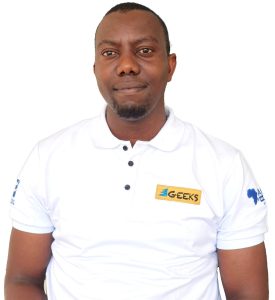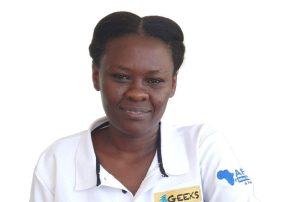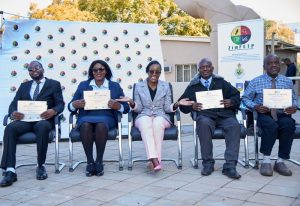Dr Mutegeki Micheal: Why I joined the GEEKS Fellowship
-
by
AFENET

Dr Mutegeki is one of the 21 fellows enrolled in Cohort 3 of the Growing Expertise in E-Health Knowledge and Skills (GEEKS) Fellowship that is currently underway in Uganda. Dr Mutegeki works with the health ministry. At the recent completion of Tier 1 of the two planned during the year-long fellowship we spoke to him and below are excerpts from the interview.
What inspired you, what motivated you to join this fellowship?
My decision to join the eHealth and Informatics Fellowship is directly inspired by the Ministry of Health’s strategic shift toward digital transformation. I have seen the Permanent Secretary champion this agenda with urgency, and it became clear to me that aligning my skills with this national direction was essential.
In my daily work within the National Malaria Elimination Division, nearly everything we do, from outbreak investigations, surveillance, data abstraction, and trend analysis, depends on digital health systems like DHIS2. These platforms generate enormous amounts of data, and I often found myself wishing for deeper knowledge to interpret that information more effectively and use it to strengthen our response.
The fellowship presented the perfect opportunity to gain the expertise I need: advanced skills in informatics, digital system design, and data analytics. By understanding these tools more deeply, I can significantly improve the quality of my work and contribute to a more efficient, data-driven Ministry of Health.
Ultimately, joining this fellowship is about positioning myself to support Uganda’s digital health agenda and becoming the kind of professional who can bridge public health and technology to drive better decision-making and better health outcomes.
Can you share a personal experience where you felt the impact of limited knowledge of eHealth had on your work?
Before I joined MoH, I had been working as a Medical Superintendent at a general hospital, so stepping into national-level outbreak work particularly in case management was a completely different environment.
One of my first major assignments was investigating a malaria outbreak in Eastern Uganda. The task required us to gather and triangulate a wide range of data: interviewing affected families and children, consulting healthcare workers, reviewing facility records, and understanding what interventions had been implemented over time. When all this information began to flow in, I suddenly found myself managing a very large and complex dataset from multiple sources.
It was during this investigation that I clearly felt the gap in my eHealth and informatics skills. I struggled with organizing the data, analyzing it efficiently, and turning it into actionable insights and scientific outputs. That experience made me realize that to be effective in national outbreak work, I needed much stronger competencies in digital data systems, data analysis, and scientific reporting.
This moment became a turning point for me, a realization that improving my eHealth skills was not just helpful, but essential for the work I do.
How do you think eHealth can transform health care delivery in Uganda?
eHealth is central to the Ministry of Health’s strategic direction, and I believe that strengthening our digital systems can dramatically transform service delivery. One clear example is medicines and supplies management. If all prescriptions were captured through platforms like eAFYA, we would have complete visibility from the number of drugs a facility receives to how many are actually prescribed. This level of transparency would enable us to track discrepancies, identify misuse, and ensure that medicines are being used appropriately.
Beyond medicines, digital systems allow us to monitor service delivery in real time: who is receiving care, at what level, and for which conditions. With such information, planning becomes sharper and evidence-based. We can identify regions with higher disease burdens at a glance, allocate resources more efficiently, and anticipate stock needs before shortages occur. Even at the national level, we would be able to see how many patients each clinician is attending to and how facilities are utilizing their resources.
In many ways, digitalization is a game-changer. Countries that have made significant progress in health outcomes have done so by fully embracing eHealth, allowing them to track patient care from the moment they enter a facility to the time they leave. This reduces wastage, enhances accountability, and ensures optimal use of limited resources.
To me, this is the future Uganda must move towards and it is one of the reasons I am committed to strengthening my skills in eHealth and supporting this transformation.
What’s the most exciting thing that you’ve learned from this Tier 1 training?
If I were to highlight one thing that has excited me most so far, it would be health informatics. From day one of this fellowship, I quickly realized how central digital systems are to health system strengthening. One of the projects we have started working on already involves evaluating an e-health system, and this experience has opened my eyes to how much impact informatics can have on service delivery and decision-making.
This is an area I am genuinely eager to continue exploring throughout the year. I want to gain the skills needed to assess different digital systems, understand how they function, and identify how they can be improved. I also hope to build stronger competencies in data analysis and scientific writing skills that will make my work more effective and evidence-driven.



